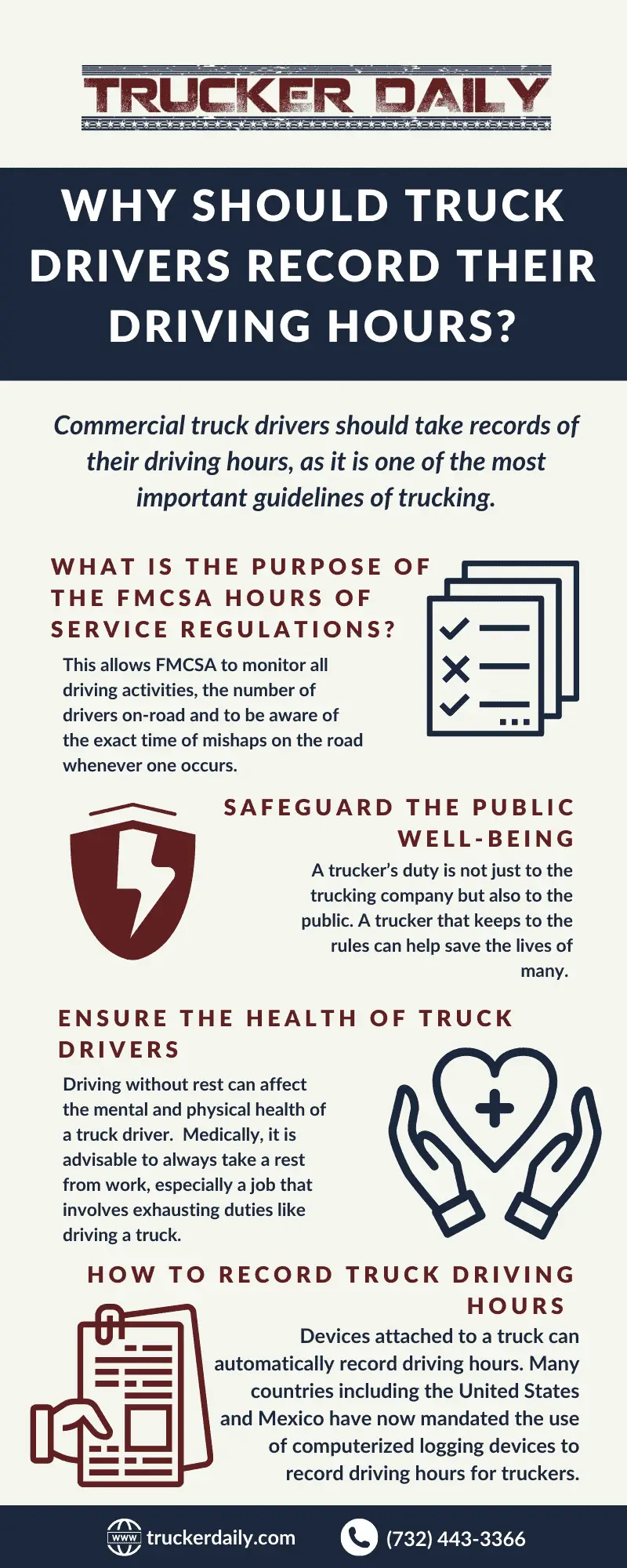Just as with every other job in the driving sector, trucking comes with possible road risks. These risks can be detrimental to the public, the trucking company, and the trucker. That is why truck drivers need to adhere to specific rules and regulations.
Truck drivers should record their driving hours because it is mandated by law. FMCSA has this as a regulation to avoid running into problems with the law, safeguard public safety, and to live a healthy lifestyle as well.
Commercial truck drivers should take records of their driving hours, as it is one of the most important guidelines of trucking.
What is the purpose of the FMCSA hours of service regulations?
The government body, FMCSA ,which presides over the trucking sector in the US, mandates that all trucking companies keep a record of the driving hours of each of their truck drivers and all truckers are to log in the time spent on the road.
The mandate also comes with a set of rules for truckers to follow. It is known as the hours of service rules.
This allows FMCSA to monitor all driving activities, the number of drivers on-road and to be aware of the exact time of mishaps on the road whenever one occurs.
In Dec. 2017, the @FMCSA required all truckers to use an electronic device to log driving hours. Today, half of the 3.5 million operating heavy-duty trucks still lack the required equipment. Here's what could happen if the push back continues: https://t.co/tzcFnfAzSF pic.twitter.com/8ZzjD6GXR1
— Trucks.com (@trucksdotcom) May 6, 2019
The hours of service (HOS) rules mandate that:
- Truckers may work not more than 60 hours over seven consecutive days or 70 hours over 8 days.
- Each of the working days may not start without 10 hours off-duty in seven consecutive working days.
- In regards to the 10 hours off-duty, truckers may work for up to 14 days straight but can drive no more than 11 hours in a day.
- After starting work, commercial truck drivers must take a 30-minute break no later than 8 hours of being on the job.
To ensure that the HOS rules are followed, the police stop and check a trucker's record of time spent on the road.
This means there is no running from the rules. Disregarding the rules and causing a problem on the road can result in an arrest or fine.
For serious offences, it can result in the suspension of the truck driver’s license, or their license being revoked entirely. This may affect the financial status of a trucker or worse, put the trucker out of a job.

FMCSA ensures these regulations are followed for 2 main purposes:
1. Safeguard the Public Well-being
Various road incidents involving truck drivers have sometimes been as a result of tiredness.
After long hours of driving without resting, the body might become weak and a trucker could lose control of the steering wheel while driving.
This may lead to a fatal accident and affect other road users and their properties.
However, keeping a record of driving hours can help a trucker comply with the HOS rules, and know when it's time to take a rest.
A trucker’s duty is not just to the trucking company but also to the public. A trucker that keeps to the rules can help save the lives of many.
2. Ensure the Health of Truck Drivers
Driving without rest can affect the mental and physical health of a truck driver.
Medically, it is advisable to always take a rest from work, especially a job that involves exhausting duties like driving a truck.
According to medical practitioners, a lack of sleep and rest can destabilize the human body system both mentally and physically.
The destabilizing of the body can put truckers at the risk of various illnesses including: depression, anxiety, paranoia, high blood pressure, stroke, heart failure, and irregular heartbeat amongst others.
Nevertheless, recording the hours spent on the road can help maintain a healthy lifestyle and keep illnesses away.

What Are the Legal Truck Driving Hours – Texas Hours of Service https://t.co/5Q6DxJmdoZ pic.twitter.com/yFp1eoM6d1
— Law Office of Richard Schechter (@RSchechterLaw) June 21, 2018
How To Record Truck Driving Hours
There is a high possibility of losing track of time when a trucker only keeps a manual record. Fortunately, this record keeping can also be done electronically.
Devices attached to a truck can automatically record driving hours. It saves truckers the stress of checking their timers and writing down their work hours. It also prevents any form of manipulation of time.
Many countries including the United States and Mexico have now mandated the use of computerized logging devices to record driving hours for truckers.
Electronic logging devices can do a better job of recording road hours than extremely tired truck drivers.
Conclusion
Keeping a record of the time spent on the road is an important aspect of being a truck driver.
Truckers are to take note of this and work by it judiciously to succeed in the trucking industry.
